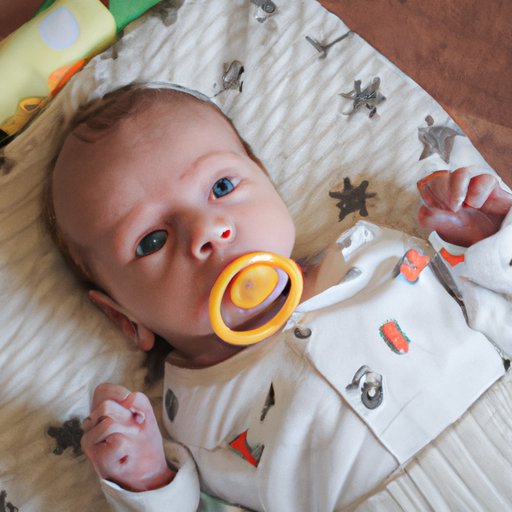Introduction
Newborns are infants from birth to about three months old. During this time, they have limited ability to regulate their own body temperature and need to be fed often. For new parents, one of the most challenging aspects of caring for a newborn is figuring out how to wake them up to eat.
Establish a Consistent Feeding Schedule
One of the best ways to ensure that you can wake up your newborn to eat is to establish a consistent feeding schedule. This helps both you and your baby adjust to a routine that works best for you both. The benefits of having a routine include better sleep patterns, improved digestion, and an overall sense of security and comfort.
When creating a feeding schedule, keep in mind that newborns should be fed at least 8-12 times a day. It’s also important to remember that not all babies are the same, so don’t be discouraged if your baby doesn’t adhere to the exact schedule you set. Some tips for setting a routine include:
- Start with a basic schedule and adjust as needed.
- Feed your baby when they show signs of hunger (crying, rooting, etc.).
- Schedule feedings around naps and bedtime.
- Be flexible and willing to adjust the schedule as needed.
Gently Wake Up Baby
Once you have established a feeding schedule, the next step is to learn how to wake up your baby gently. There are several different ways to do this, including talking softly, singing or humming a lullaby, lightly stroking their face, or rubbing their back or tummy. All of these methods help stimulate your baby’s senses and encourage them to wake up.
The benefits of waking up your baby gently include helping them adjust to being awake and alert, as well as calming them and helping them feel secure. In addition, it gives you the opportunity to bond with your baby and provide them with the attention and love they need.
Change Diapers
Changing diapers after waking up your baby is another important step in the process. Not only does it help keep your baby clean and comfortable, but it can also help stimulate their senses and make them more alert. It’s important to be gentle and patient when changing diapers, and to use a soft cloth or washcloth to wipe away any messes.
In addition to keeping your baby clean and comfortable, changing diapers can also help prevent diaper rash and other skin irritations. Be sure to always use a mild soap and warm water, and dry the area thoroughly before putting on a fresh diaper.
Talk to Your Baby
Talking to your baby is another great way to help wake them up. It can help stimulate their senses and make them more alert. Plus, it’s a great way to bond with your baby and help them feel secure and loved. When talking to your baby, try to keep your tone gentle and soothing, and use words that are easy for them to understand.
Some ideas for things to say include simple phrases like “Hi there!”, “Good morning!”, or “It’s time to eat!” You can also talk about what you’re doing or what the weather is like outside. No matter what you say, just be sure to keep it simple and positive.
Use a Pacifier
Using a pacifier can also be helpful for waking up your baby. Pacifiers are designed to mimic the feeling of sucking on a bottle or breast, making them a great tool for soothing and calming your baby. Additionally, pacifiers can help reduce the risk of Sudden Infant Death Syndrome (SIDS).
When using a pacifier, it’s important to only give it to your baby when they are awake and alert. This will help ensure that they don’t become dependent on it for sleeping or feeding. Additionally, it’s important to never leave your baby unattended with a pacifier in their mouth.
Conclusion
Taking care of a newborn can be challenging, especially when it comes to waking them up to eat. By following the tips and techniques outlined in this article, you can help ensure that your baby gets the nourishment they need while also providing them with the comfort and security they deserve. Establishing a consistent feeding schedule, waking up your baby gently, changing diapers, talking to your baby, and using a pacifier can all help make the process easier.
Caring for a newborn is a big responsibility, but it can also be incredibly rewarding. With patience and practice, you can help ensure that your baby has the best start in life.
(Note: Is this article not meeting your expectations? Do you have knowledge or insights to share? Unlock new opportunities and expand your reach by joining our authors team. Click Registration to join us and share your expertise with our readers.)
